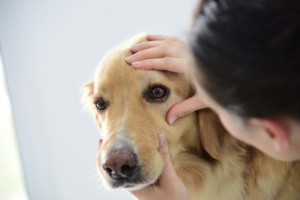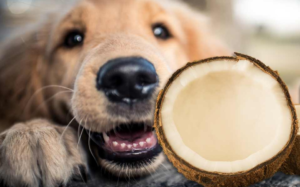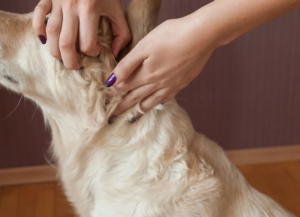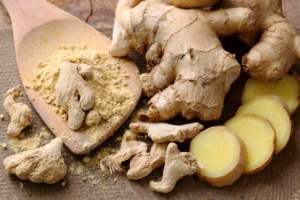Natural Treatments For Dry, Itchy Skin In Dogs
Table of Contents
If you’ve ever suffered from dry, itchy skin then you’ll know how much of a hassle this can be. Constantly having to apply loads of moisturizer throughout the day just to get by without scratching, shedding or looking like a lobster.
However, on humans, dry skin is a lot easier to detect and treat – even on the hairiest of bodies and the driest skin.
While some of us may suffer from skin disorders such as eczema or hyperpigmentation that require chronic or constant medicinal treatment, finding a suitable form of treatment could take a while. Sensitive skin types can often develop adverse side-effects to conventional, chemical based lotions or medications. In recent times, due to a large and growing movement away from these conventional treatments (‘conventional’ by the standards of pharmaceutical companies and the often limited scope of modern medicine), people have started utilizing more holistic forms of medicine as a means of treating their ailments.
Thankfully though, when we suffer from dry, itchy skin, we don’t feel inclined to roll around on the lawn or rub ourselves up against the furniture – we can simply apply a lotion or a diluted essential oil to the affected area and watch the irritation disappear. However, dogs often have a harder time dealing with this issue as their fur often hides any visible symptoms of skin irritation.
If you notice that your dog is licking him/herself constantly, there’s probably a good chance that they’re suffering from one of the many skin irritations that affect dogs. So if you think your pooch may be suffering from a skin disorder, or you’re looking for a more holistic way to treat infections then I’d recommend that you continue reading. I’ll be listing a few of the more common causes for dry, itchy skin as well as holistic methods for treating them and keeping your pets skin, infection and irritation free.
The Cause of Dry Itchy Skin in Dogs

There are a wide variety of factors that can cause your dog to suffer from dry, irritable and itchy skin

There are a wide variety of factors that can cause your dog to suffer from dry, irritable and itchy skin
There are a wide variety of factors that can cause your dog to suffer from dry, irritable and itchy skin. Identifying the cause of the issue is usually the best way to find a suitable holistic treatment. One of the first signs to look out for is a parasitic infection such as mange (mites) or fleas. These are usually the most common causes for dry, itchy skin and hair loss if you walk your dog on a regular basis. Especially in the summertime, as fleas enjoy cool, shady areas which dogs are inclined to rest in when it’s hot out.
Once you’ve managed to identify the type and nature of the infection, you can seek an appropriate treatment method – but I’ll get into that a bit later in the article. However, it’s important that you act immediately once you’ve identified the nature of the infection because the longer your dog is infected, the more chance the little critters have of infecting the rest of your home.
It’s important to note that other than simply causing itchy bites on your skin, these parasites can carry bacteria which, when transferred to you, can cause the formation of serious disease.
The next three causes are also relatively common and other than a flea or mite infection, they’re probably the most likely to affect your dog. These are allergies, a poor diet and cold weather. Determining a dog’s allergy can be quite a challenging process as there are a lot factors that can trigger an allergic reaction in your dog and you basically have to go through a process of elimination to determine the root cause. The advice of a vet is probably best in this case.
Cold weather, overusing indoor air conditioning or heating can dry your dog’s skin out and cause them to itch – much like human skin. Thankfully though, there are easy and holistic ways to keep your pet’s skin hydrated and still keep your air conditioning on or take them for walks regardless of the weather – but we’ll get to that in a bit.
With regards to feeding your dog a healthy and balanced diet, it’s always important to include more natural ingredients in their food – especially if they’re only eating conventional kibble. There are a variety of recipes and techniques you can utilize to improve your dog’s diet, but it’s important to discuss this with your vet, as certain foods could cause a negative reaction in your dog.
Finally, I would recommend that you stay away from standard pet shampoos if you find that your pet is still suffering from dry, itchy skin or excessive shedding after/during use. There are a wide variety of natural alternatives that I would recommend using instead.
Top 5 Essential Oils for Itchy Skin in Dogs
Coconut oil

When it comes to using it on your pets, coconut oil is an amazing natural skin treatment

When it comes to using it on your pets, coconut oil is an amazing natural skin treatment
As I’m sure that you’ve already noticed, the growing trend of using coconut oil in everyday life has really taken hold these days. The running joke seems to be that you can use it for nearly any and every ailment, illness or disease – and thankfully, the truth isn’t too far from this.
When it comes to using it on your pets, coconut oil is an amazing natural skin treatment and can help to treat eczema, reduce allergic reactions, prevent yeast and fungal infections, reduces odor and of course, helps to nourish and hydrate dry and itchy skin.
The added benefit of coconut oil is that it can also be used to treat your pet internally and can easily be added to their diet. You’ll be able to combat infections and issues related to the thyroid as this can lead to dry and itchy skin as well as acting as a powerful natural antibacterial and antibiotic.
By giving your pet a daily dosage, you’ll not only help to treat any existing bacterial infections, but you’ll also be able to prevent them from forming at a later stage by building up your pet’s immunity. By using the oil on a regular basis, your pet’s coat will also start to look healthier and more natural as the oil is absorbed by your skin and hair follicles – which means that they’ll be nourished and hydrated from within, making them stronger and healthier.
This two-pronged approach to treating your dog is the most effective way of doing so as it means that you’ll be able to prevent any skin irritations from occurring in the future (or at least build up your pet’s resistance to them) as well as treating the root cause of the issue. Thus, you will be treating the full extent of the ailment rather than simply addressing the superficial symptoms.
Because of this, I would highly recommend that you keep a jar of coconut oil in your home at all times because it’s great for both you and the pooch – especially for those dry winters, windy areas and homes that simply cannot do without air conditioning.
Lavender oil

Lavender oil can help to eliminate any foul odors that may be lingering in your pet’s fur
While lavender oil may not be as useful as coconut oil in that you cannot give it to your dog as a means of treating any internally related infections, it’s great for topical use. I’m quite sure that we’re all aware of the truly delightful smell that lavender has – it’s light and floral yet strong enough to neutralize any unwanted odors.
But a lot of people probably don’t realize how powerful this oil is as a natural antibiotic, antiseptic and anti-anxiety treatment. Even when used topically, lavender oil can have tremendous healing effects on your skin and overall health – the same applies to your dog.
When used in a diluted form or as part of a natural shampoo recipe, lavender oil can help to eliminate any foul odors that may be lingering in your pet’s fur as well as removing the buildup of any unwanted or potentially harmful bacteria that may lead to skin irritation or infections.
When dealing with lavender oil as a topical treatment for skin related ailments it would be wise to use it in controlled or regulated dosages, as even though it’s a natural product, essential oils are still highly concentrated and potentially hazardous when used in large quantities.
I would recommend diluting the oil in a suitable carrier oil such as almond oil or even olive oil and then applying the oil to a rag or paper towel as a means of rubbing it into your dog’s coat. Be sure to avoid getting the oil anywhere near your dog’s eyes, mouth, ears and, well – the butt. This may result in a negative reaction in certain dogs and cause an infection.
So long as you dilute the oil and stick to a regulated dosage, your pet should be fine. The reality is, that it’s still a great deal safer than many of the toxic concoctions on offer for treating pet-related infections or skin disorders. So while it may be a bit of an adjustment (although not much in reality), the payoff is well worth it in the long run.
https://twitter.com/essential_shop/status/880031209446834177
Cedarwood oil
Cedarwood oil is a potent natural pesticide and insect repellent for both pets and humans. It has been utilized for these purposes for quite a long time and is often included as an active ingredient in a variety of natural shampoos and skin treatments.
The oil has quite a distinctive smell that some may find too overpowering or simply not suited to their palate. If you’re not bothered by it, it can really help to neutralize odors on your pet. The same rule with regards to using lavender oil on your pet also applies to cedarwood oil. As with any essential oil for that matter: too much could have adverse effects on your pet and wind up costing you time and money that you wouldn’t have otherwise had to spend.
So, it’s important to water it down or mix it up with a suitable carrier oil. If you’re pet is suffering from a flea or mite infection then Cedarwood oil is probably going to be one of your most effective natural tools for treating the issue.
If you realize that your pet is infected with either fleas or mites, it’s imperative that you act immediately before the infection spreads throughout your home or onto your other pets. I would recommend mixing a tablespoon of cedarwood with about 500 ml of vinegar into a spray bottle and using only this on your pet’s back. While it may not smell great (you can always wash it off after applying it ), the mixture is a potent pest repellent.
The vinegar gets rid of fleas immediately. The strong taste is overpowering for them and the additional scent of cedarwood keeps them at bay for some time after application. It’s important to keep the oil from sensitive areas such as ears, eyes and the mouth as this could lead to irritation.
When compared to the conventional chemical-based treatments that are offered on the market, the risks involved with using cedarwood oil to treat and control infections are much lower. The results speak for themselves. It’s definitely the way forward for pet care in my opinion, as it’s a cheaper, effective and safer alternative that’s steadily catching on.
Niaouli oil

Niaouli oil can be used to help treat wounds, sores and irritated skin on your dog
While not being it’s most popular use, Niaouli oil can be used to help treat wounds, sores and irritated skin on your dog as well as even easing the pain associated with rheumatism.
The oil is particularly popular in France, and vets there tend to favor using the oil in combination with distilled water – water that has been boiled and allowed to cool.
To apply the oil, simply add it to a rag or paper towel and run it through your dog’s coat. This will help to remove any excess dirt and grime that may harbor unwanted bacteria on your dog’s skin which could lead to infection at a later stage. It will also help to hydrate and nourish your dog’s skin and hair follicles, while killing off any foul odors at the same time.
I would recommend using it particularly as means of treating your dog after a flea or mite infection, as it will help to heal any wounds or scars that may have formed during the infection as well as reducing redness and itchiness (it’s a natural anti-inflammatory) .
The oil can also help to kill off any larvae or remaining parasites without damaging your pet’s skin any further; it’s one of the safest essential oils for pet use.
Ginger oil

Ginger has been used for a long time as a natural anti-inflammatory treatment
Much like coconut oil, ginger oil works tremendously well for treating your pet both internally and externally. It can be included in your pets diet in it’s natural form, as well as an essential oil. However, it’s important that you discuss this with a veterinarian before doing so as using too much could lower your dog’s blood pressure at it’s been known to thin the blood.
While this may be great for treating specific ailments or illnesses, if your dog suffers from diabetes or has a heart condition, it could lead to further health complications. So be sure to know how much is the right amount for your dog (as it may differ depending on breed and size).
Ginger has been used for a long time as a natural anti-inflammatory treatment and as a means of ridding the body of bacteria as it works as a natural diaphoretic i.e. it makes you sweat more, therefore helping you to flush toxins out of the bloodstream.
By rubbing neat ginger oil onto your pet’s coat, you can help to remove any additional bacteria on the surface of their skin, as well as help to stimulate the growth of new hair follicles because increased blood flow means that more nutrients reach the required area and therefore encourage cell growth.
Ginger also has a strong natural smell that not only helps to control and reduce the effects of odors, but also helps to prevent further infection. It’s a great oil to have around the home as it’s incredibly versatile and very effective – for both you and your pet.
DIY Skin Treatment for Dogs Recipe and Guide
This is a pretty straight-forward natural shampoo recipe that you can try out on your dog at home. It’s a two step process that not only helps to clean and freshen your dog’s coat (while being totally free of any potentially harmful chemical ingredients), but it also acts as a form of protection against any further infection or disease.
I would highly recommend using this as it helps to keep your dog clean and fresh, whilst also improving the quality of their coat and restoring its natural sheen. It’s a simple recipe that shouldn’t take you too long to make plus you can also buy most of the ingredients in bulk quite easily, so you’ll be sure to have enough to last a while. If you’re not used to DIY projects or creating your own homemade recipes, then this is a great one to start with. What you need:
- 7-10 drops of Eucalyptus oil.
- 7-10 drops of Ginger oil.
- 7-10 drops of Lavender oil.
- 500 ml of Castile soap.
- 2 tablespoons of vinegar (preferably distilled white vinegar).
- 500 ml of warm water.
Making the shampoo is as easy as adding the essential oils to the castile soap (I have recommended a few because of their effectiveness and hygienic odor, but you can feel free to use whichever ones you want).
Once this is done, wet your dog thoroughly and rub the shampoo into their coat, keeping free of the ears, eyes, mouth and genital areas. Once you’ve created a nice, thick lather, wash the soap off your dog’s coat thoroughly. If soap is left on your dog, it could crust and lead to clumpy hair and dry skin.
This is where the vinegar and warm water come in. Simply add the 2 tablespoons of vinegar to the warm water and stir well. Then use this (either in spray form or simply as is) to rinse your dog’s coat one last time. This will help to kill off any parasites that may be lingering on your pets coat as well as forming a layer of protection against these pesky little critters in future.
Again, just be sure to keep the water out of your pet’s eyes, mouth, ears and genital areas. I’ve been using this for sometime now and have only had great results. So I recommend giving it a try and saving yourself a lot of time, money and future costs.
Conclusion
Ultimately, natural alternatives are always the best ‘first-option’ available to pet owners. The pet care industry has a long history of using harmful or otherwise toxic chemicals in their formula’s.
As many will already know, using conventional or pharmaceutical products often come with a long list of ‘side-effects’ that are actually just the ‘effects’ of the drug, marketed in such a way that the chances of their occurrence are supposed to seem unlikely.
While it may be true that they aren’t always guaranteed to happen, the risk isn’t really worth it in my opinion. So if this is how modern medicine works for humans, one can only imagine how messy (or even backward) certain branches of animal medicine must be.
Being able to treat your dog in a healthy and holistic way is the best way to ensure that they are healthy and in good condition without having to spend a fortune on costly medications, shampoos and visits to the vet. I’d highly recommend at least trying this route as a viable option. After all, a healthy dog is a happy dog.
No comments yet.